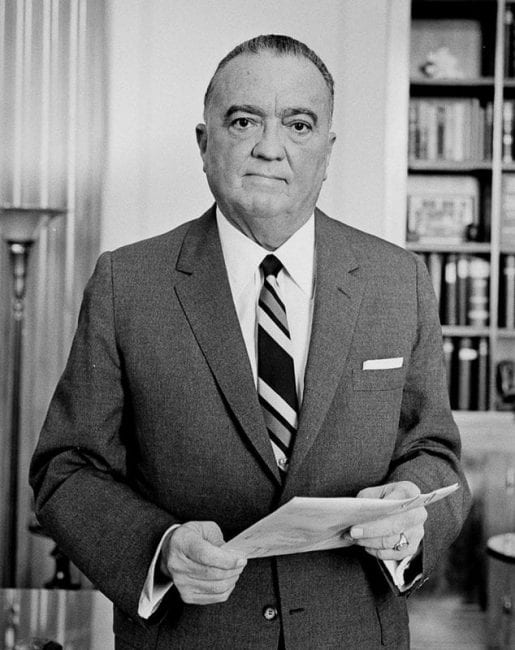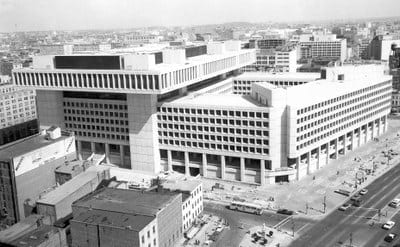
Blackmail artist Hoover: He certainly cast a long and malignant shadow.
[dropcap]I [/dropcap]was Ubering down Pennsylvania Avenue the other day when I passed my favorite Washington location that demands a wrecking ball. It's not a statue to some forgotten slaveholder nor a memorial to some Jim Crow booster — Woodrow Wilson, for instance — but a building bearing the name of a racist, anti-communist zealot who, in the name of God and the American flag, set out to destroy Martin Luther King Jr. I am talking about J. Edgar Hoover and the lump of cement named for him.
 The J. Edgar Hoover FBI Building, headquarters of the FBI since 1975, is almost as great a wonder as the Great Pyramid of Giza. What keeps it standing and bearing Hoover's name is impossible for me to understand. Throughout the country, indignant people have taken to the streets to demand the toppling of this or that statue — famously, Robert E. Lee's in Charlottesville just recently. At Princeton University, some students demanded the obliteration of Woodrow Wilson's name from some school buildings. He was once the university's president.
The J. Edgar Hoover FBI Building, headquarters of the FBI since 1975, is almost as great a wonder as the Great Pyramid of Giza. What keeps it standing and bearing Hoover's name is impossible for me to understand. Throughout the country, indignant people have taken to the streets to demand the toppling of this or that statue — famously, Robert E. Lee's in Charlottesville just recently. At Princeton University, some students demanded the obliteration of Woodrow Wilson's name from some school buildings. He was once the university's president.
Much of Hoover's legacy is odious, and it is repellent to honor it anywhere. But Washington is a special place. It may no longer be known as "Chocolate City" — the first major American city to have a black majority — but it remains 48 percent African American and as liberal as a city can be. Yet Hoover reigns unnoticed and unprotested, as if his attempts to destroy King did not matter.
Of course, the percentage of blacks in Washington or the number in Congress — 48 in the House and three in the Senate — is wholly beside the point. King was an American, revered by people of all races for making this country better for us all. Hoover, though, was a man who thought the Constitution did not apply to him. He was also a man of his time, of course — intolerant of gays, lesbians and even FBI agents who did not dress neatly. Amazingly, his record as a gangbuster is a bit spotty. For years, he even denied the existence of the Mafia. The 1957 gathering of mob bosses at Apalachin, N.Y., forced him to finally acknowledge reality.

MLK would have expected Hoover's corruption and abuses of power to be eventually rewarded with a whole building, in a republic based on injustice and grotesque inequality.
Hoover was an accomplished blackmailer — and every president knew it. President Harry S. Truman early on noted Hoover's interest in the sex lives of others, saying, "We want no Gestapo or secret police. FBI is tending in that direction." Under Hoover, the FBI so thoroughly infiltrated the Communist Party that William G. Hundley, a savvy Justice Department prosecutor, once remarked that Hoover's "informants were nearly the only ones that paid the party dues."
It was Hoover's malignant belief that King was under the influence of communists that led him to bug the civil rights leader's room at Washington's Willard Hotel. What he heard was reportedly plenty gamey — but no crime. Nevertheless, it delighted Hoover. "This will destroy the burrhead," he said of the future Nobel Peace Prize winner. The bugging was approved by Attorney General Robert Kennedy. The historian Taylor Branch wrote that Kennedy feared what Hoover had on the Kennedy family, particularly JFK's industrial philandering.
Hoover let others know what he had on King. Certain journalists were let in on the potential scandal. King sensed that Hoover wanted to drive him to suicide.
"They are out to break me," King said. "They are out to get me, harass me, break my spirit." The FBI recorded that, too.
The unlawful and totally outrageous attempt to undermine and destroy King was Hoover at his most egregious. Yet he also directed the so-called COINTELPRO program in which the FBI engaged in burglary and illegal wiretaps, spread false rumors, forged documents and otherwise acted as if it was above the law. And it did so with impunity. The program only ended in 1971 after it was exposed by some gutsy anti-war activists.
It just so happens that I have taken an unequivocal "it depends" stance on the removal of certain statues or the changing of names. Lee has to go because he is best known for fighting to retain slavery. Wilson was a racist, but that does not overwhelm the achievements of his presidency. As for Hoover, it's true that he essentially created the FBI and served as director of the bureau (and its predecessor agencies) from 1924 until his death in 1972. That ain't nothing.
But when I look down Pennsylvania Avenue and see Hoover's name still on the FBI Building, I don't think of the longevity of his career, but of his abuses, particularly his attempt to ruin the reputation and the work of Martin Luther King Jr. It's a small remedy, but the name has to go.
Read more from Richard Cohen's archive.

![]() The Russian Peace Threat examines Russophobia, American Exceptionalism and other urgent topics
The Russian Peace Threat examines Russophobia, American Exceptionalism and other urgent topics In his zeal to prove to his antagonists in the War Party that he is as bloodthirsty as their champion, Hillary Clinton, and more manly than Barack Obama, Trump seems to have gone “play-crazy” — acting like an unpredictable maniac in order to terrorize the Russians into forcing some kind of dramatic concessions from their Syrian allies, or risk Armageddon.However, the “play-crazy” gambit can only work when the leader is, in real life, a disciplined and intelligent actor, who knows precisely what actual boundaries must not be crossed. That ain’t Donald Trump — a pitifully shallow and ill-disciplined man, emotionally handicapped by obscene privilege and cognitively crippled by white American chauvinism. By pushing Trump into a corner and demanding that he display his most bellicose self, or be ceaselessly mocked as a “puppet” and minion of Russia, a lesser power, the War Party and its media and clandestine services have created a perfect storm of mayhem that may consume us all.— Glen Ford, Editor in Chief, Black Agenda Report
In his zeal to prove to his antagonists in the War Party that he is as bloodthirsty as their champion, Hillary Clinton, and more manly than Barack Obama, Trump seems to have gone “play-crazy” — acting like an unpredictable maniac in order to terrorize the Russians into forcing some kind of dramatic concessions from their Syrian allies, or risk Armageddon.However, the “play-crazy” gambit can only work when the leader is, in real life, a disciplined and intelligent actor, who knows precisely what actual boundaries must not be crossed. That ain’t Donald Trump — a pitifully shallow and ill-disciplined man, emotionally handicapped by obscene privilege and cognitively crippled by white American chauvinism. By pushing Trump into a corner and demanding that he display his most bellicose self, or be ceaselessly mocked as a “puppet” and minion of Russia, a lesser power, the War Party and its media and clandestine services have created a perfect storm of mayhem that may consume us all.— Glen Ford, Editor in Chief, Black Agenda Report




